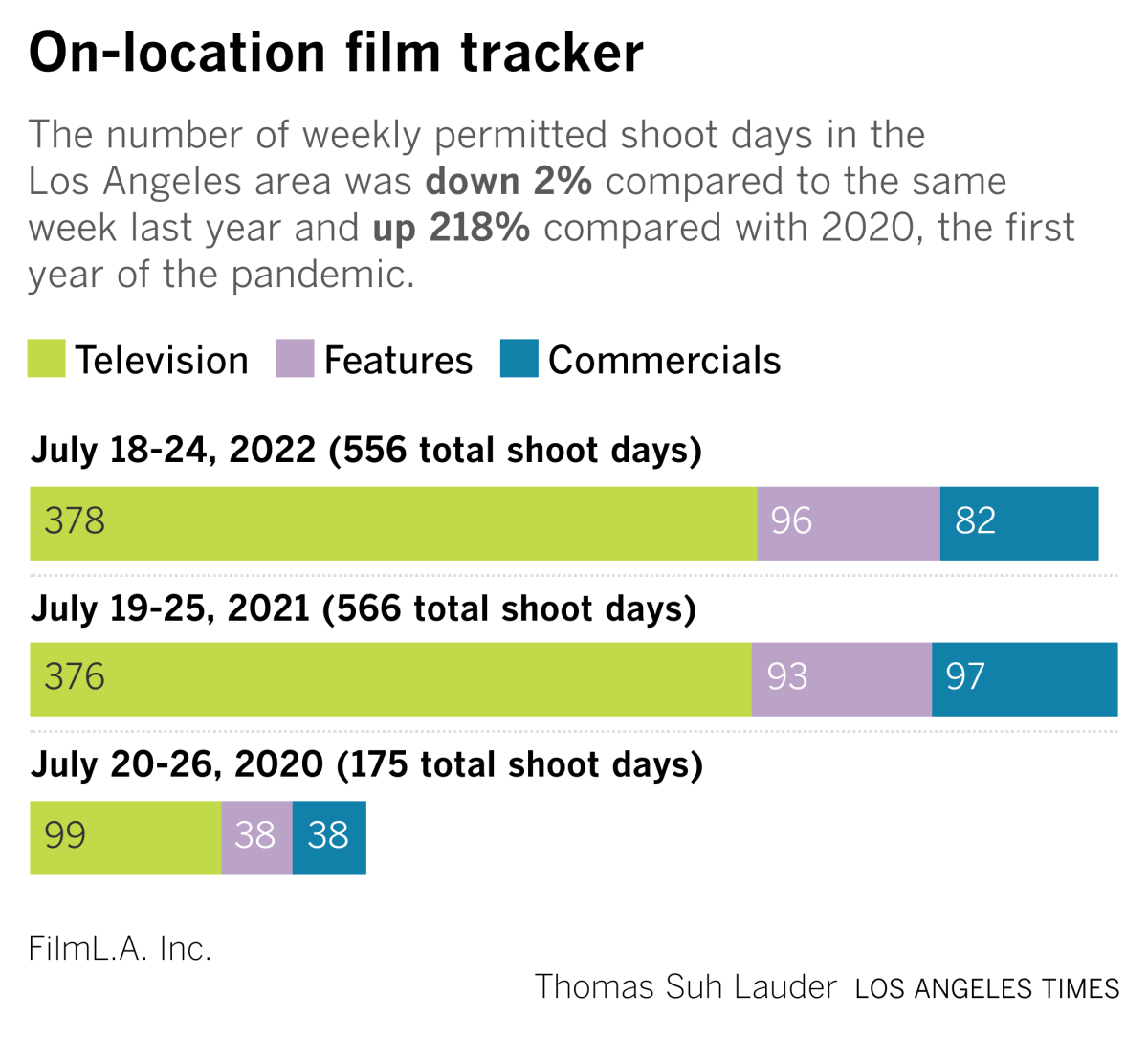Wide Shot: The making of ‘Bull Durham’ and the strange state of sports movies

Welcome to the Wide Shot newsletter about the business of entertainment, where I promise there are fewer bots than the “Justice League” campaign. Sign up here to get it in your inbox.
The script for 1988’s “Bull Durham” was passed on by every studio in Hollywood.
Twice.
Ron Shelton, who drew on his own experiences to write the screenplay, got it made anyway.
The story of how it happened is the subject of Shelton’s book “The Church of Baseball: The Making of Bull Durham,” which was published this month. There are many tales of conflicts, close calls and downright bizarre studio notes. (Susan Sarandon didn’t look good as Annie Savoy? Tim Robbins’ performance wasn’t working?)
The film was a hit, grossing about $50 million, which would equal well more than $120 million in today’s dollars. Shelton received an Oscar nomination for the screenplay and went on to write and direct “White Men Can’t Jump” and “Tin Cup.”
Sports movies are in a weird place in today’s film business. In 2022, “Bull Durham” probably would be made for Netflix or Amazon Prime, perhaps as a limited series. Movies about baseball are especially rare. I spoke with Shelton about the current state of sports films, the agonies of studio notes and why third acts are overrated.
Read the full interview here, but here’s a sample.
Let’s talk about the state of sports movies now. There was “The Way Back” with Ben Affleck, “King Richard” with Will Smith and then “Hustle” with Adam Sandler. But there used to be at least a couple of them every year, it seemed.
I think we’re being strangled by algorithms. I think the sports movie goes into the computer and the computer doesn’t know what to do. The algorithm says, “This doesn’t sell in Bulgarian television,” or something. Sports movies tend to be domestic-driven, because we don’t make movies about sports other than the ones we play in North America. And I don’t think the studios or the networks are run by riverboat gamblers anymore. They’re run by committee. These kinds of movies are gut-instinct movies. They go against the grain because they don’t check all the boxes for an international audience. It’s why nobody wanted to make “Bull Durham.” They said there was no foreign business. Well, I’m still getting residual checks for North American rights.
“The Queen’s Gambit” is about chess but follows the format of a sports movie. I’ve seen the argument that “Top Gun: Maverick” is basically a sports movie with F-18s. Has the genre just been hoovered up and incorporated into other types of film?
Yes, it has. I don’t think of “Top Gun” as a sports movie, but I understand the underlying paradigm. Stories that are interesting are not the stories about the winner of the Super Bowl or the heavyweight championship. It’s about everybody else trying to win the Super Bowl. If Rocky wins, nobody remembers the movie. Rocky goes the distance and loses, and a franchise was born. And that’s the right ending. If Woody Harrelson ends up with Rosie Perez in “White Men Can’t Jump,” I’ve disrespected the Rosie Perez character and the whole idea of what the movie’s about. And if Crash Davis gets to the big leagues, that’s a false ending.
You write that every studio passed on “Bull Durham.” What was it that got this film over the edge for Orion Pictures?
Sheer luck. On the morning of the last day that I could hold on to Kevin Costner, his movie “No Way Out” opened in New York to a rave review from the New York Times, which declared that Kevin Costner was going to be a huge movie star. “No Way Out” was released by Orion Pictures, who we’d given the script to the night before for the third time. They woke up to this review and they have Kevin Costner’s next movie if they want it. Had “No Way Out” not opened to a rave review that morning, this movie would never have been made. The irony is, the only reason “No Way Out” opened in August was because Orion didn’t know what to do with it. That’s where you used to send movies to die. But it was a hit, and it allowed a bigger hit, “Bull Durham,” to be made.
In the book, you express little patience for companies making movies as loss leaders for theme parks. Now they’re making them as loss leaders to sell toilet paper and iPhones. Is this having a negative effect on the industry?
I’m not unhappy that a lot of movies get made that don’t interest me. When they sell tickets, it’s good for everybody making movies. I like everything to be a hit. It’s just that movies about human behavior are less and less on anybody’s schedule. But when they finally get through to the theater or on streaming, everybody loves them. I just think human behavior is the most interesting thing to make movies about. The audience is desperate for movies about human behavior. Funny, tragic, inspiring, whatever.
Stuff we wrote

— They’re pouring celery juice in Vilnius. Netflix, HBO and others are turning countries like Lithuania and Estonia into filmmaking hubs. But going Hollywood comes with complications for far-flung parts of Europe. A must-read. For more, how well do you know Hollywood movies? Take this filming-locations quiz.
— Did departing academy chief Dawn Hudson ruin the Oscars, or save them? She led the film academy through the most transformational, and tumultuous, period in its history, leaving insiders to fiercely debate her legacy.
— Roland Martin believes in Black-owned media. And he’s using his own money to prove it. Although mainstream news organizations have added more diversity on camera and in the executive suite, Martin says having sources dedicated to Black audiences still matters.
— OAN or DOA? One America News Network’s days may be numbered after being dropped by Verizon. The San Diego-based right-wing channel has lost most of its distribution.
— Headlines, headlines, headlines. WWE will restate earnings following misconduct allegations against Vince McMahon. Academy member sentenced to 8 years in state prison for child molestation as accusers file lawsuit. The NFL games you’ve been watching on your phone are going behind a paywall. Chris Cuomo regrets how things ended. ‘It’ producer sets up accelerator for racial equity. Police investigate fatal shooting of ‘Law & Order’ crew member.
Number of the week

Netflix shed nearly 1 million subscribers in the most recent quarter — the biggest decline in its history and its second consecutive quarterly loss of membership — and that was considered good news for investors. Such is the nature of Wall Street’s expectations game. At least it wasn’t 2 million, as executives forecast three months ago. Look at Snap, which missed analysts’ low forecasts and was punished with a massive drop in its stock price.
Huge viewership for Netflix’s top franchise, “Stranger Things,” clearly helped mitigate the damage wrought by increased competition in the streaming market from HBO Max, Disney+ and others. The trick will be creating more franchises while keeping content spending in check at $17 billion annually. The other big question is how Netflix will introduce ad-supported streaming as a cheaper option in a way that will grow subscribers and revenue without cannibalizing its business too much when it hits the market in early 2023.
Catch-up reading
— Tiffany Hsu on Alex Jones and the economics of misinformation. (New York Times)
— Brent Lang with another deep dive on movie star salaries. (Variety)
— Roxana Hadadi on the revenge of the working-class sitcom. (Vulture)
— Tatiana Siegel on the “Snyder Cut” bot army. (Rolling Stone)
— Lane Brown on why CGI looks so crappy on your expensive TV. (Vulture)
Hollywood production
According to FilmLA data, shoot days in Los Angeles last week were down slightly compared to the comparable week in 2021.

Finally ...
Apropos of nothing, here’s a 2017 video of James Blake covering Don McLean’s “Vincent.” And for good measure, here’s the original.
Inside the business of entertainment
The Wide Shot brings you news, analysis and insights on everything from streaming wars to production — and what it all means for the future.
You may occasionally receive promotional content from the Los Angeles Times.




